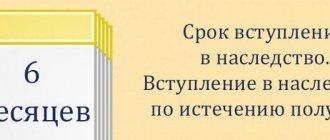Inheritance after grandparents is a controversial thing. On the one hand, people quite often live in “grandmother’s former apartment” or have “a house in the village that I inherited from my grandfather.” On the other hand, in principle they are not on the inheritance waiting list. How can this be?
This state of affairs regularly raises puzzling questions. In this article we will describe in detail how inheritance occurs after grandparents, and what features it has.
First, let's review the basics. People receive inheritance in two ways:
- According to the will. The testator has the right to bequeath acquired property to anyone: relatives, friends, neighbors, even legal entities. Naturally, grandchildren often become heirs in a will. And even more often, they are bequeathed not the entire inheritance, but a certain part of it. For example, the same apartment or dacha.
- According to the provisions of the law. If a will is not drawn up, the heirs “line up”, and the closest relatives, which do not include grandchildren, have priority rights. This, at first glance, seems strange, but has a completely logical explanation.
What kind of heirs are the grandchildren?
In Art. 1142 of the Civil Code of the Russian Federation determines that in inheritance by law, children, parents and spouses are recognized as first-priority heirs. Grandchildren are also among the heirs of the first priority, but with the proviso that they can inherit the property of the testator by right of representation. According to the Civil Code of the Russian Federation, there is no other way for them to become the owner of an inheritance.
In accordance with Part 1 of Art. 1146 of the Civil Code of the Russian Federation, property can be inherited by a grandson by right of representation only in the event of the death of another heir of the first priority. In such a situation, the share of property entitled by law to the son or daughter of the testator must pass to his grandson. If there are several grandchildren, the inheritance is distributed among them in equal proportions.
But this is how things are only at first glance. A careful study of the provisions of the Civil Code of the Russian Federation can reveal serious contradictions that prevent the heirs from assuming their rights. First of all, this concerns the rules governing inheritance by law.
Heirs of the first stage: rights of heirs of the first stage
How to establish the fact of being a dependent
There are various grounds for establishing dependency. Disabled spouses and immature children (or disabled children over 18) do not need to certify anything, but specifically in relation to their parents. They are a priori defined as keepers. Others are advised to document such care.
In a situation with the patronage of grandparents, an unambiguous notarized consent will be required for each ward. It can be kept secretly, but only a formalized confirmation certified by a lawyer will help further enter into inheritance with the allocation of a share.
Inheritance by grandchildren by law
Since the grandchildren are one of the testator's closest relatives, they have a higher priority of inheritance than the heirs of the second and other lower orders. However, the rules for entering into inheritance rights are very contradictory.
Is it possible to consider grandchildren as independent heirs?
In accordance with paragraph 2 and paragraph 3 of Art. 1146 of the Civil Code of the Russian Federation, the descendants of the heir by law cannot take ownership of the property of the deceased in the following cases:
- The testator, by will, deprives the heir of property that should have passed to him by law.
- The direct heir was declared unworthy on the basis of Art. 1117 of the Civil Code of the Russian Federation. He will lose all rights to the property of the deceased if he commits unlawful acts against the testator, his relatives or other heirs with intent, as well as if he makes an unlawful attempt to increase the share due to him. These facts must be confirmed by a court decision.
From the above provisions we can conclude that grandchildren are not independent heirs. Their rights to property are derivative in relation to their parents, who inherit first.
Grandchildren can exercise their right to receive an inheritance if the deceased heir is not deprived of the right to receive it.
Will dependent grandchildren receive an inheritance?
In Art. 1148 of the Civil Code of the Russian Federation defines the rules of inheritance by disabled dependents. However, the provisions of this norm do not apply to grandchildren, because they apply only to heirs of the second stage and below. This means that they cannot enter into inheritance rights even if they are dependent on a deceased citizen for a long time.
The injustice of the provision in question seems obvious, but it still continues to apply. Let us explain the essence of the situation with a simple example.
Let's assume that the testator's dependents are a disabled stepson and grandson. After his death, his stepson, on the basis of Part 3 of Art. 1145 of the Civil Code of the Russian Federation, has the right to register the share due to him as a disabled dependent. At the same time, a grandson who is actually in the same position cannot claim property due to being a dependent. Grandchildren do not belong to any category of heirs listed in Articles 1143-1145 of the Civil Code of the Russian Federation, which is referred to in Part 1 of Art. 1148 of the Civil Code of the Russian Federation.
From Part 2 of Art. 1148 of the Civil Code of the Russian Federation it follows that grandchildren can still enter into an inheritance as disabled dependents, but only on the condition that they lived with the testator for at least a year. But at the same time, according to Part 2 of Art. 1442 of the Civil Code of the Russian Federation, they can inherit only by right of representation. This may prevent dependent grandchildren from receiving an inheritance.
Inheritance by law: order of succession (scheme)
Role of the notary
The notary plays the main role in accepting and entering into inheritance under a will or in order of priority after the death of a grandmother. It’s worth starting with the submission of an application by the heirs. If the grandson cannot be personally present when submitting the application to the notary’s office, you can send your representative. But first, you must issue a notarized power of attorney to transfer powers regarding the entire procedure for receiving the property of the deceased grandmother.
The duties of the notary office employee include checking the correctness of the data entered into the application, the relevance of the information provided, reliability, and the duration of the time period for accepting the inheritance.
After the period for accepting the property expires (according to Article 1154 of the Civil Code of the Russian Federation, it is six months), each successor who has declared his rights receives his share in the property of the deceased relative. The notary must issue a certificate of inheritance to everyone. Based on this document, property rights are formalized.
Based on Chapter 11 of Law No. 4462-1 of February 11, 1993 “Fundamentals of the Legislation of the Russian Federation on Notaries,” the notary must confirm and record:
- the fact of death of the owner of the property;
- the legality of opening an inheritance on a territorial and temporal basis;
- the right of each successor to a share, if such was declared in the prescribed manner;
- the full composition of property included in the list for succession of property;
- determine the circle of creditors (if any) and their claims to the property of the deceased.
If it is difficult to establish the existence of the grandmother’s property, the notary must take action to discover the deceased’s belongings. An employee of a notary office must formulate and send requests to various authorities, individuals and legal entities.
The notary performs all actions after interested parties contact him. The obligation to carry out hereditary actions on one’s own initiative is not established by law.
Can grandchildren claim their grandmother's inheritance while their parents are alive?
Since grandchildren are not direct heirs, they cannot inherit on their own. This means that a grandson cannot independently claim his grandmother’s inheritance on the same basis as one of his parents. The law allows grandchildren to inherit only by right of representation, that is, after the death of their parent before or simultaneously with the testator.
In accordance with Part 1 of Art. 1148 of the Civil Code of the Russian Federation, grandchildren also cannot enter into inheritance rights together with other persons who inherit the property of the deceased in the first place. At the same time, dependents who are not his close relatives find themselves in a more advantageous position.
Thus, a grandson can inherit the property of a grandmother or grandfather while the parent is alive only if there is a will in his favor.
Useful tips
Grandmother or grandfather died, who is the heir? When resolving an issue related to the redistribution of the property of an elderly person, he and his relatives should take into account a number of nuances that may affect the implementation of his decision.
In this case, it is recommended to observe the following points:
- Do not commit any illegal actions in relation to the testator and people close to him.
- Register a will with a notary.
- Competently drawn up, this document clearly indicates the portions due to each relative.
- Do not violate anyone's rights when dividing the inheritance.
- If illegal actions occurred against the testator on the part of one of the grandchildren during his lifetime, it is best to go to peace and ask for forgiveness so that the pensioner will relent and change the will.
If you make a mistake at the preparatory stage, it will be difficult to correct it after the death of the person. In the folklore of the Russian people there is a proverb: “What is written with a pen cannot be cut down with an ax.” Challenging a will by going to court is more difficult than simply taking into account all the nuances when drawing it up with a notary.
Sources
- https://ros-nasledstvo.ru/vnuki-nasledniki-kakoj-ocheredi-posle-smerti-babushki-dedushki/
- https://NasledstvoHelp.ru/vnuki-nasledniki-kakoj-ocheredi-po-zakonu/
- https://naslednik.info/ochered/prava-vnukov-na-nasledstvo.html
- https://law-divorce.ru/vnuki-nasledniki-kakoj-ocheredi-posle-smerti-babushki-dedushki/
- https://yur-pomoshch.info/o_nasledstve/poryadok-nasledovaniya-vnukami
Inheritance by grandchildren by will
If the testator is interested in the property belonging to him passing to his grandchildren after his death, he can draw up a will in their favor. In this case, no obstacles that the heir will face in the absence of such a document will apply.
In Art. 1119 of the Civil Code of the Russian Federation formulates the principle of freedom of will. It means that the testator, at his own discretion, has the right to bequeath the property belonging to him to any persons, as well as to deprive relatives and other citizens of inheritance to whom it is due by law. He is not required to indicate the reasons for his decision. This also applies to the inclusion of grandchildren in the will. A document has legal force only if it has been certified by a notary (Part 1 of Article 1124 of the Civil Code of the Russian Federation).
If there are several grandchildren, the testator can distribute his property among them in any proportion. At the same time, he has the right to leave some of them without an inheritance at all.
The heir under the will will receive all the property that should pass to him on the basis of the relevant document. The exception is situations when there are heirs who must be allocated a certain share (including dependents). In this case, their inheritance rights can also be realized at the expense of property bequeathed to other persons. This means that the share of grandchildren will be reduced.
How to enter into an inheritance under a will after the death of the testator
Features of judicial practice
When considering cases in court, decisions were repeatedly made according to which property that was supposed to go to grandchildren was transferred to heirs from lower levels. If it turned out that there were no other claimants to the inheritance, it was declared escheat and subject to transfer to the ownership of the municipality.
What all such paradoxical situations have in common is that the testator has not prepared a will, and his son or daughter is missing. We are talking here specifically about recognizing a citizen as missing, but not about declaring him dead. Since the heir is not recognized as deceased, the grandchildren of the testator cannot inherit his property by right of representation.
You can expect a review of the case only after the testator’s parents are declared dead in court. Then the grandchildren can receive the property due to them through hereditary transmission. However, such a scenario has a chance to be realized only in a situation where a court decision to declare a citizen dead came into force no later than 6 months after his death.
Registration of inheritance in property
If nothing prevents the testator’s grandson from entering into inheritance rights, he can proceed to register the property in his own name. To do this, he should adhere to the following scheme:
- Prepare all necessary papers.
- Write an application for acceptance of inherited property or for the issuance of a certificate of inheritance.
- Visit the notary office located at the last known place of residence of the deceased citizen. If there is no information about where he lived, you should contact a notary at the location of the property being registered as ownership. The same rule should also be followed in the case where the inheritance was left on the territory of the Russian Federation, and the testator lived abroad.
- Submit the application and accompanying documentation to the notary.
- Pay the state fee and do not forget to take a receipt confirming this action.
- Present the receipt of payment of the state fee to the notary.
- Obtain a certificate of inheritance.
In certain situations, the testator's grandson must also pay for the necessary technical services.
Applications for acceptance of inheritance by a grandson
An application is a mandatory document that confirms the intentions of a participant in legal relations to receive an inheritance. The application is submitted to the notary.
If the grandson is a minor:
- For minors under fourteen years of age (minors), only parents, adoptive parents or guardians write an application on their behalf.
- minors aged fourteen to eighteen years old write an application themselves, with the written consent of their legal representatives - parents, adoptive parents or guardian.
| Applications for acceptance of inheritance by a grandson after the death of a grandmother |
If real estate is inherited, you will need to contact Rosreestr to register ownership of the property.
If you inherit a vehicle, it must be registered with the traffic police.
Entry cost
Receiving an inheritance does not occur free of charge. The grandchildren will have to spend money on some services. You will have to pay a fee for issuing a certificate of inheritance. According to Art. 14 of the RF IC, the relationship between grandmother and grandson is close. The amount of the duty, according to Art. 333.24 of the Tax Code of the Russian Federation will be 0.3% of the value of the inherited property, but not more than 100 thousand rubles.
You will also have to pay:
- for conducting an independent assessment of the value of the inheritance;
- for notary services;
- state duty for registering property rights to real estate.
According to Art. 333.24 of the Tax Code of the Russian Federation, the notary will need to pay:
- 200 rubles are required for preparing and certifying powers of attorney. If the heirs independently represent their interests without involving third parties, this expense item can be skipped.
- An inventory of inherited property costs 600 rubles;
- for each official request from the notary office, the successors will spend 150 rubles;
- 300 rubles for opening an envelope with a closed will, if one has been drawn up.
Answers to questions asked to a lawyer
Father died. My brother and I are the only heirs. Can I give up my share in favor of my children?
You cannot give up your share in favor of your children. Your children are not independently included in the number of first-line heirs, but can inherit only by right of representation of their parent (only after the death of their parent).
Who will be the heir after mom's death? My sister died a year before my mother died. She left behind a grown adult son. He wants to inherit from his grandmother (my mother). Is this legal?
After your mother's death, you and your sister are the first priority heirs. Since your sister has died, her children will be called to inherit by right of representation (clause 2 of Article 1142 of the Civil Code of the Russian Federation). Your sister's son will inherit her share.
Hello. Father died. If I do not accept the inheritance, will my children (his natural grandchildren) have the right to this property?
If you do not accept the inheritance, your children (grandchildren of the testator) will not have rights to this property. According to the general rules of inheritance by law, the inheritance will pass to other heirs. Grandchildren inherit after the death of their parents - children of the testator, by right of representation.
After the death of my father, the heirs are me and the three children of my late brother. Can I give up my share in favor of my brother's children?
Yes, Article 1158 of the Civil Code of the Russian Federation allows other heirs by law to refuse the inheritance in favor of heirs by right of representation.









